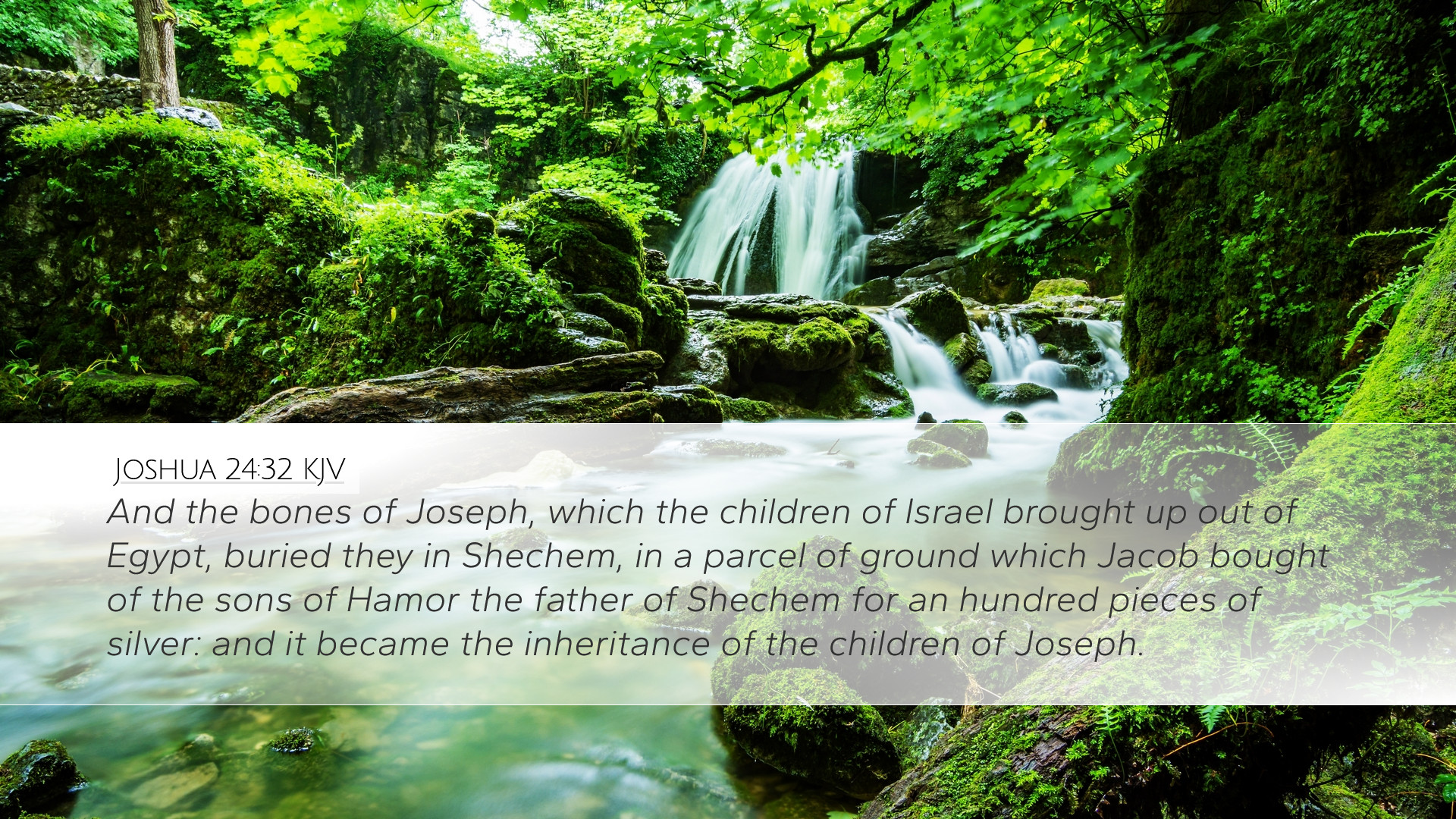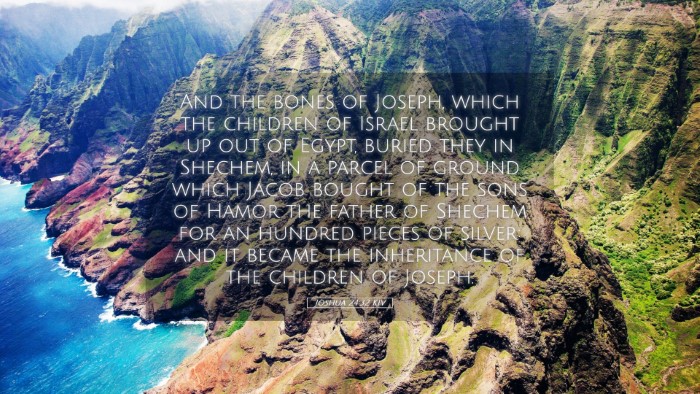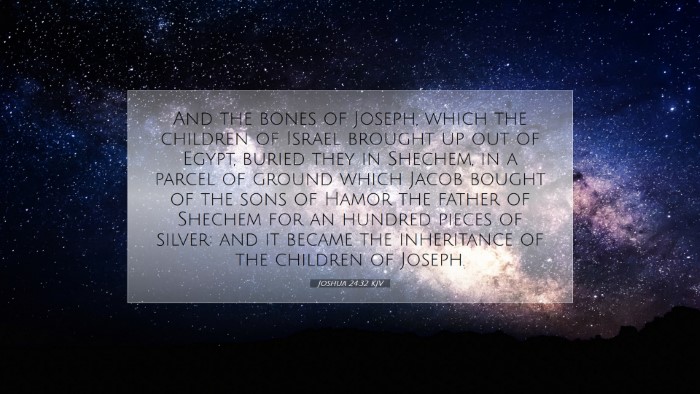Commentary on Joshua 24:32
This verse, “And the bones of Joseph, which the children of Israel brought up out of Egypt, buried they in Shechem, in a parcel of ground which Jacob bought of the sons of Hamor the father of Shechem for an hundred pieces of silver: and it became the inheritance of the children of Joseph,” encapsulates significant theological themes and historical insights.
Introduction
Joshua 24:32 serves as a powerful conclusion to the book of Joshua, highlighting the faithfulness of God and the fulfillment of the promises made to the patriarchs, particularly with regards to Joseph’s burial. This commentary draws from esteemed public domain sources, providing layered interpretations that inform the understanding of this passage for pastors, students, theologians, and Bible scholars.
Historical Context
Joseph, one of the sons of Jacob, had an extraordinary life marked by trials, triumphs, and unyielding faith in God. His wish to be buried in Canaan (Genesis 50:25) became a reality in this verse, aligning with the broader redemptive history of Israel. The act of carrying Joseph's bones from Egypt is significant—the Israelites demonstrate fidelity to their ancestral legacy even amidst their challenges during the exodus.
Matthew Henry's Insights
Matthew Henry notes the importance of the burial site, emphasizing that it symbolizes not only a return to the Promised Land but also God’s faithfulness to His covenants. He elaborates on the juxtaposition of the “bones” as a representation of mortality contrasted with the vitality of divine promises. The act of burying Joseph in Shechem is a testament to the fulfillment of God’s promise regarding the land He swore to give to Abraham, Isaac, and Jacob.
Insights from Albert Barnes
Albert Barnes expounds on the significance of Shechem as part of the inheritance of the two tribes of Joseph—Ephraim and Manasseh. He explicates that the purchase of land by Jacob (Genesis 33:19) underscores the serious nature of divine promises. This location serves not merely as a geographic marker but as a spiritual reminder of Israel's journey and covenant relationship with God. Barnes emphasizes the enduring legacy of Joseph that transcends his life, positioning him as a pivotal figure in Israel’s narrative.
Adam Clarke's Commentary
Adam Clarke provides a linguistic analysis of the term “bones,” which he interprets as a metaphor for legacy and remembrance. Clarke stresses that the burial of Joseph’s bones indicates not only respect for the deceased but also an acknowledgment of God's providence throughout Joseph’s life. The act itself was a fulfillment of both Joseph's personal wishes and a sign of confidence in God's promises regarding the land. Clarke notes the economic aspect of Jacob's purchase, tying the land transaction to Israel's rightful claim and ownership, which reflects God's providential care.
Theological Implications
The burial of Joseph’s bones in Shechem serves several pivotal theological themes:
- Covenantal Faithfulness: This act signifies God's unwavering faithfulness in fulfilling His covenant promises. Joseph's burial site becomes a beacon of hope and a reminder of God's enduring commitment to His people.
- Promise and Legacy: The act of transporting Joseph's remains highlights the importance of remembering and honoring one’s heritage. It emphasizes the necessity of passing down faith and realizing that the legacy of the faithful continues beyond the grave.
- Intersection of Life and Death: There is a poignant reminder of the human experience as encapsulated in the burial of Joseph's bones. It serves as a metaphor for mortality while simultaneously invoking the promise of resurrection and redemption through Christ.
Practical Applications
For contemporary readers, particularly leaders within the church, Joshua 24:32 offers numerous applications:
- Honoring Heritage: Like Joseph, congregations are called to honor their spiritual heritage and traditions. This can involve revisiting church history and acknowledging the faith of those who came before.
- Faith in God's Promises: The passage encourages individuals to trust in God’s faithfulness and promises. Believers today can find assurance in God's commitment to their future, echoing Joseph's faith amid adversity.
- Communal Responsibility: The community of Israel collectively engages in Joseph's burial, reflecting the need for believers today to support one another, recognizing their collective journey in faith.
Conclusion
Joshua 24:32 serves as a powerful reminder of God's faithfulness throughout generations. By reflecting upon the insights of Matthew Henry, Albert Barnes, and Adam Clarke, scholars and pastors can appreciate the rich history and theology embedded in this verse. As we contemplate Joseph's story and burial, we are encouraged to uphold the promise of God in our own lives and communities while recognizing the importance of legacy and faithfulness in the journey of faith.


